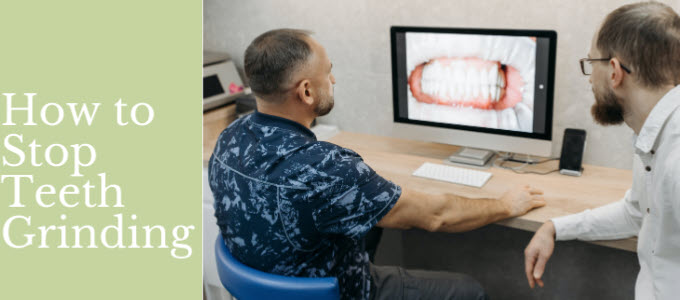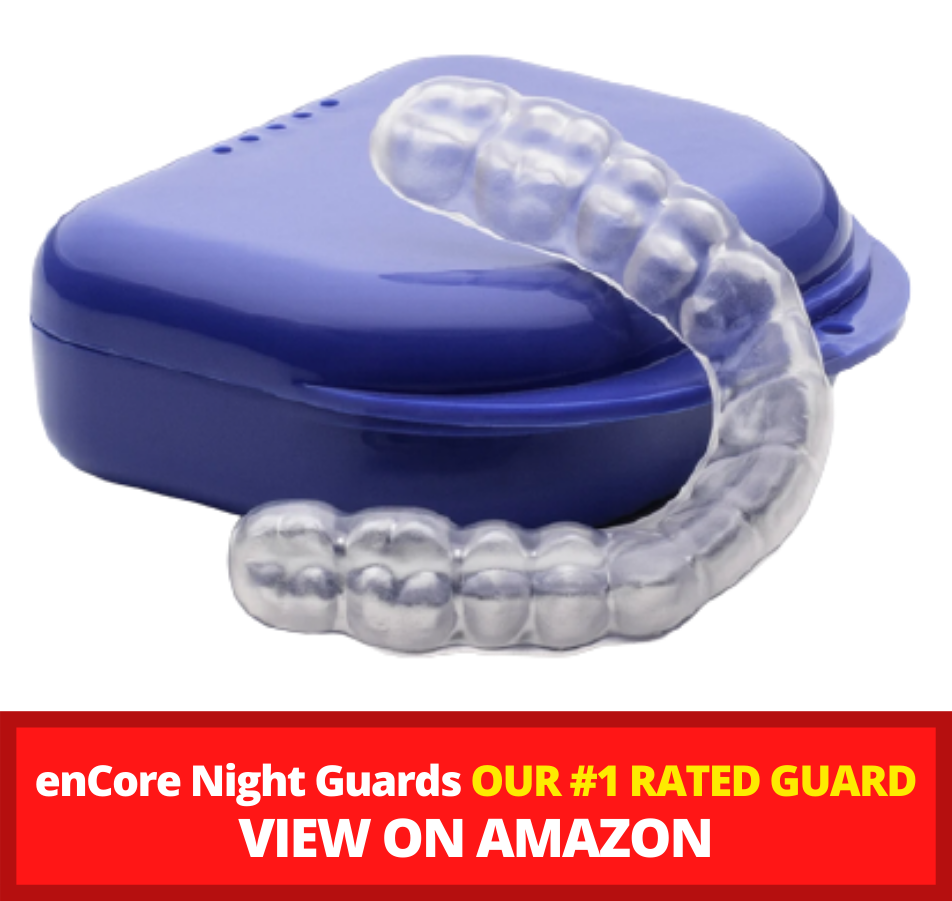Table of Contents
- 1 How To Stop Teeth Grinding
- 1.1 1. Splints And Mouthguards
- 1.2 2. Exercise
- 1.3 3. Relax Before You Go To Bed
- 1.4 4. Start Massaging The Jaw Muscles
- 1.5 5. Become More Aware Of Clenching Or Try Biofeedback
- 1.6 6. Stop Chewing On Non-Food
- 1.7 7. Try To Stay Away From Chewy Foods
- 1.8 8. Jaw And Tongue Muscle Exercises
- 1.9 9. Start Practicing Meditation
- 1.10 10. Try Reductive Coronoplasty
- 1.11 11. Talk Therapy
- 2 Conclusion

Grinding of the teeth or otherwise known as bruxism may have severe consequences for one’s dental health. Even though clenching your teeth occasionally is perfectly natural, doing so on a daily basis will most likely cause damage as well as produce a variety of symptoms that can impact you during the day. But do you know what you should do in order to stop grinding teeth during sleeping? There are a lot of useful methods you can use and that’s exactly what we’ll be talking about in this article (1).
How To Stop Teeth Grinding
1. Splints And Mouthguards
Mouthguards are the type of occlusal splint for sleep bruxism. They cushion the teeth, preventing them from grinding against one another during sleeping. Some mouthguards are custom-made at a dentist’s office while you can purchase others OTC (over the counter). In case you experience chronic sleep bruxism, then custom-made mouthguards will help in protecting your teeth from any damage, including a severe one. Additionally, they can reduce a strain on the jaw as well. But you need to know that custom-made mouthguards tend to be more pricey than OTC options, however, it can be a better option for some people.
Custom-made mouthguards typically come in different degrees of thickness. They are specifically designed to fit one’s jaw’s shape and size. They’re usually more comfortable than most store-bought mouthguards because they are made of significantly softer material.
Most OTC nighttime mouthguards are made of plastic. Some people may not find them as comfortable and pleasant to use as custom-made ones. If you decide to purchase an OTC mouthguard, make sure to look for the one that you can boil to soften it or the one made of soft plastic. Even though OTC mouthguards are not typically as effective for severe cases of bruxism as custom-made ones, their low cost can still make them quite a viable and attractive solution for many people who have minor teeth grinding problems.
2. Exercise
Try to add a couple of exercises to the weekly routine. Oftentimes, bruxism is caused by stress, after which the accumulated tension tends to manifest in the teeth grinding. To avoid stress or get rid of already existing stress or tension, you should exercise a few times a week.

3. Relax Before You Go To Bed
Make sure to unwind from all the existing tension accumulating in your jaw before bedtime. You can try some relaxing techniques like the following:
- Taking a warm bath just before you go to bed so that you can relax the jaw muscle.
- Applying the heating pad or wet, warm towel to the jaw.
- Drinking non-caffeinated, herbal tea in order to warm up the mouth.
4. Start Massaging The Jaw Muscles
Do you sometimes clench your jaw during the day while being confronted with a negative or stressful situation? If your answer is “yes”, then try relaxing your face as well as give the jaw muscles the massage. Rubbing can release tension that often builds up during the day.
5. Become More Aware Of Clenching Or Try Biofeedback
You can grind the teeth throughout the day and not be able to recognize it. Try practicing mindfulness a few times a day to relax a bit. You will start noticing specific times or situations when the teeth grinding becomes more pronounced. The moment you recognize its occurrence, prevent it by dropping the jaw, letting it hang for just a moment. Then move it gently and try maintaining a relaxed jaw position.
Or you can try biofeedback; a technique that is designed to help individuals in becoming aware of their behavior and eliminating it, if needed. It may be used for alleviating both awake as well as sleep bruxism. During biofeedback, the biofeedback therapist can teach you the ways to control the jaw muscle movements through vibratory, auditory, or visual feedback that is generated from electromyography.
6. Stop Chewing On Non-Food
Do you chew gum all day or enjoy chewing ice as you work? You should stop all these repetitive motions so that your jaw won’t be clenched.
7. Try To Stay Away From Chewy Foods
Avoid eating popcorn, steak, and taffy during the days when bruxism flares up. These foods need a lot of chewing, which can further wear out the jaw.
8. Jaw And Tongue Muscle Exercises
Jaw and tongue muscle exercises will help in relaxing the jaw as well as facial muscles all the while maintaining proper alignment of the jaw. You can try the following efficient exercises:
- Open the mouth wide as you touch your tongue to the front teeth. This exercise can help in relaxing the jaw.
- Try saying the letter “N” out loud. It can keep the top as well as bottom teeth from touching, helping you to avoid clenching.
9. Start Practicing Meditation
Meditation can help you to significantly reduce stress as well as alleviate pain, anxiety, and depression. You can try downloading the meditation app if that is what you prefer or you can join the meditation group. Also, you should keep in mind that meditation takes practice and time. You can also use it in conjunction with some other treatments as well.
10. Try Reductive Coronoplasty
It is a dental procedure that can be used for reshaping or leveling a biting surface of the teeth. It is usually effective if the cause of teeth grinding issue is due to misaligned, crooked, or crowded teeth. In certain instances, the second procedure known as additive coronoplasty can be used as well for building up the teeth.
11. Talk Therapy
High levels of stress may worsen teeth grinding. To prevent this, talking to the counselor, therapist, or a family member or trusted friend can be a good option; it can help in reducing depression, anxiety, as well as stress. If stress severely affects your daily life, then the psychiatrist may prescribe some medications to you so that you can reduce stress and anxiety.
Conclusion
As you can see, there are many great methods you can use to stop teeth grinding. All you should do now is to choose the one or the ones that you think will work the best for you and start seeing the positive result.


